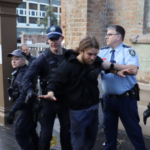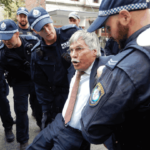SA Major Parties Attempt to Extinguish Climate Protest With Draconian Penalties

As the South Australian Labor and Liberal parties worked in tandem last week to rush through harsh laws to stamp out climate protests, it was as if the Malinauskas government had simply ripped a page out of the NSW playbook and followed the 2022 moves of its counterparts in Sydney to a T.
On Monday 14 March, Extinction Rebellion (XR) SA began a week of nonviolent direct actions and by Thursday the 18th, the SA lower house had passed a bill, enabling the financial penalty for such actions to be upped from a $750 fine to $50,000, whilst a 3 month stint in prison is also on the cards.
The political outcry over the climate defence protests began heating up on Wednesday, when an XR member abseiled off the Morphett Street Bridge in Adelaide’s CBD, bringing a halt to morning peak hour, which disrupted “business as usual” to make the point that the climate crisis is escalating.
Leader of the Liberals in opposition David Speirs appeared on talkback radio Thursday morning to suggest that severe fines be applied to unauthorised protests, while the ability to lock up climate defenders would also be a reasonable power for authorities to wield.
And in what seemed to be an attempt to appear like it was his idea to introduce a rights-eroding antiprotest regime first, SA premier Peter Malinauskas said in an interview later that day that he’d be doing just that, if only he could obtain “bipartisan approval”, which he obviously already had.
A mockery of parliament
“The Malinauskas government’s kneejerk antiprotest laws will send a chill down the spine of all those who value the right to protest in our democracy,” SA Greens MLC Robert Simms told Sydney Criminal Lawyers.
“Given South Australia’s proud tradition of social reform, it’s devastating to see us follow states, like Tasmania and NSW, down this path.”
And indeed, it is, as NSW kicked off this approach in April last year, when it enacted an antiprotest regime, with bipartisan approval, that entails fines of $22,000 and/or up to 2 years imprisonment for the unauthorised obstruction of a bridge, tunnel, road or major facility.
“The approach to this bill makes a mockery of our parliamentary processes,” Simms further made clear. “The move was announced on talkback on Thursday morning and by lunch time the bill had already passed the House of Assembly.”
“The bill was rushed through the lower house without any consideration of the impacts or opportunity for community feedback,” he added.
And that’s perhaps the strangest similarity between the NSW and SA scenarios, as last year then NSW roads minister Natalie Ward complained on 2GB radio that a protest had delayed her and called for more “severe penalties”. And a fortnight later, a bill was rushed through in just two days.
Industry free rein
Meanwhile, the Australian Petroleum Production and Exploration Association (APPEA) conference was taking place at the Adelaide Convention Centre, with participants having suffered delays on Wednesday morning as the XR abseiling protest had successfully blocked traffic bound for the event.
Yet, despite the fact that it’s now no longer disputed that there is a climate crisis occurring and, therefore, a cut to fossil fuel use is desperately required, the Guardian reported SA energy and mining minister Tom Koutsantonis having told the peak body that his government is at its disposal.
And Koutsantonis handed over the keys to his state just a few days prior to the World Meteorological Organisation announcing that temperatures “are likely to surge to record levels in the next five years”, and will exceed the “1.5°C above pre-industrial levels” threshold by 2027.
An XR South Australia spokesperson told SCL that this event was why their members had sought to disrupt the city last week, as, on having perused the APPEA program, “it was evident that the industry is set on a pathway of misinformation and capture of governments”.
“At this conference, they were planning to open up new gas and oil reserves. This needed to be exposed,” the XR spokesperson said. “APPEA corporations were pushing back on increased government regulation, which included comments in the conference program.”
Direct action needed
The other key XR SA action to draw the ire of authorities occurred last Thursday, which saw four climate defenders arrested for spray painting the building housing the SA headquarters of gas giant Santos, just prior to the state major party leaders’ on-air threats of draconian law reform.
“We know that we are marked out as radical activists, even though about 90 percent of our activities are not disruptive in any way,” the climate defender added. “In general, there are two or more activities per week when averaged over a year.”
“Very few of these receive media attention,” the spokesman continued. “Only activities causing some degree of shock or disruption receive media attention.”
And both Labor and the Liberals are well aware of this, and that’s why they’re attempting to silence the most effective form of dissent, which is attempting to alert the general public to the fact that the unprecedented floods and bushfires of late are only a taste of what’s to come.
Things are heating up
“Extinction Rebellion SA members are not surprised by this reaction,” the spokesperson said of the new penalties. “But we’re surprised by the haste, lack of dignity and willingness to fall into step behind the state opposition who first proposed the changes.”
Passed by the SA lower house, the Summary Offences (Obstruction of Public Places) Amendment Bill 2023 makes fairly serious amendments to section 58 of the Summary Offences Act 1953 (SA), as it ups the applicable fine by over 6,000 percent and adds prison time to what’s a minor offence.
The changes also involve a new subsection 58(1a), which outlines that “a person may be found guilty of an offence against this section whether the person’s conduct directly or indirectly obstructed the free passage of a public place”.
And these laws are expected to traipse their way through the SA Legislative Council when it next sits in early June.
“If only the major parties were willing to work together to address the climate crisis with the urgency with which they rammed these laws through the lower house,” said Simms, adding that “given the scale of the existential threat posed by climate change”, the actions of activists are natural.
“Seeking to intimidate or silence protestors, will do nothing to address the climate crisis and amounts to seeking to silence the messenger,” the SA Greens MLC said in conclusion.







